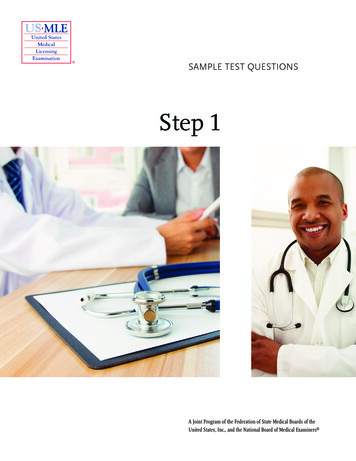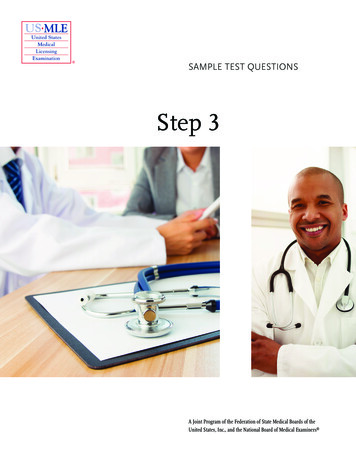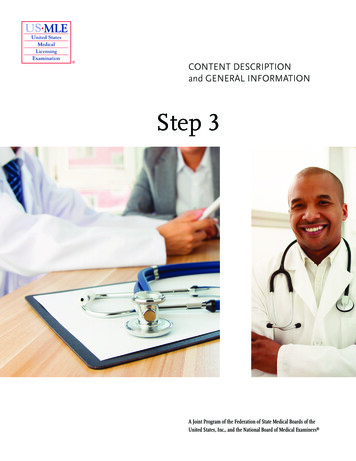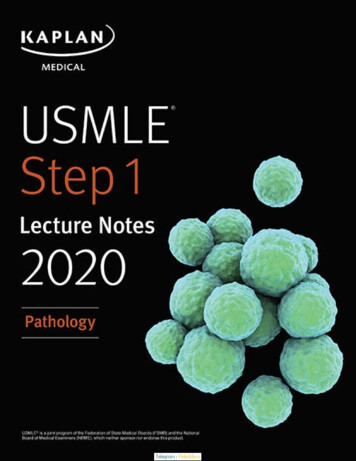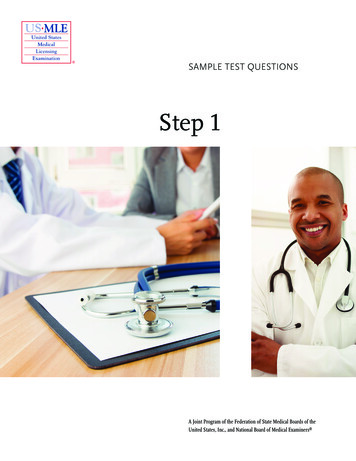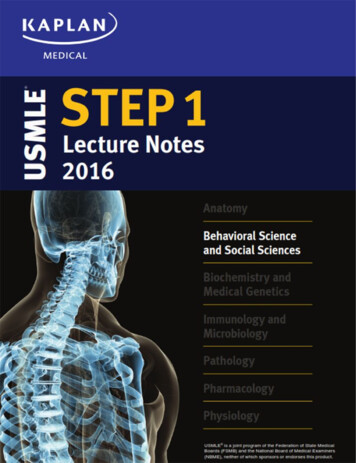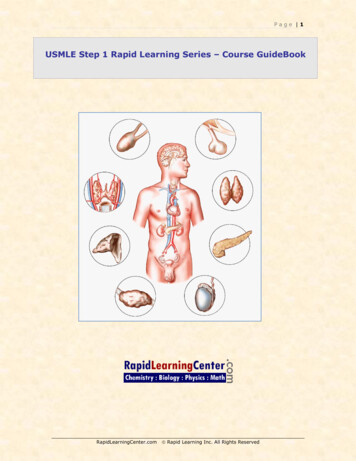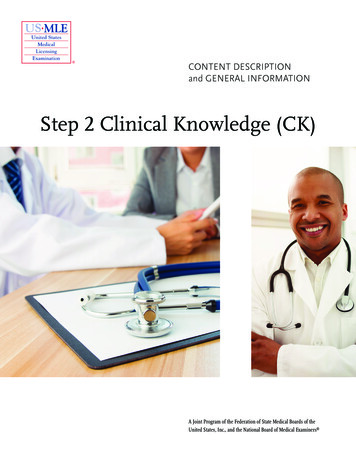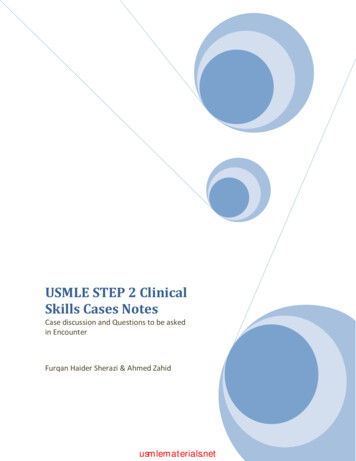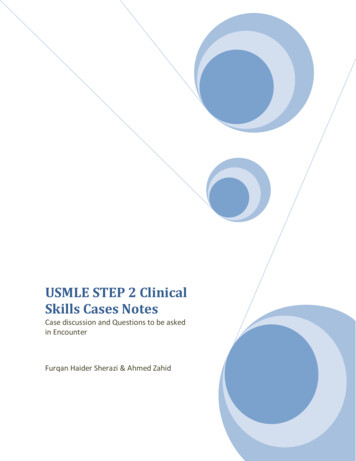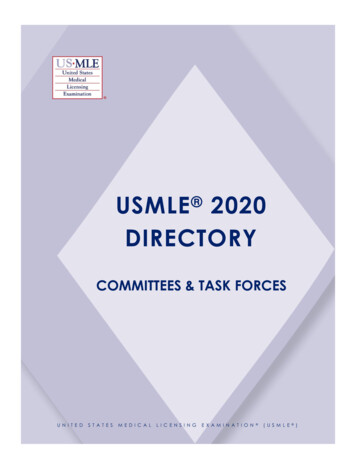
Transcription
USMLE 2020DIRECTORYCOMMITTEES & TASK FORCESU N I T E DS T A T E SM E D I C A LL I C E N S I N GE X A M I N A T I O N ( U S M L E )
TABLE OF CONTENTSUSMLE Committees .4USMLE BUDGET COMMITTEE.4USMLE COMMITTEE FOR INDIVIDUALIZED REVIEW .5USMLE COMPOSITE COMMITTEE .6USMLE MANAGEMENT COMMITTEE .8CLINICAL SKILLS ASSESSMENT ADVISORY GROUP .10STEP 2 CLINICAL SKILLS TEST DEVELOPMENT TASK FORCE .11USMLE TEST MATERIAL DEVELOPMENT COMMITTEES (TMDCs).13AMBULATORY CARE TMDC .14BEHAVIORAL HEALTH TMDC .15BIOSTATISTICS AND EPIDEMIOLOGY TMDC .16CHILDREN’S HEALTH TMDC .17CHRONIC CARE TMDC .18COMPUTER-BASED CASE SIMULATIONS (CCS) COMMITTEE .19GROSS ANATOMY AND EMBRYOLOGY TMDC .22INTRODUCTION TO CLINICAL MEDICINE, PHYSICAL DIAGNOSIS, AND COMMUNICATION TMDC .23MICROBIOLOGY AND IMMUNOLOGY TMDC .24NEUROLOGY/NEUROSCIENCE TMDC .25PATHOLOGY AND GENETICS TMDC .26PATIENT SAFETY TMDC .27PHARMACEUTICAL ADVERTISEMENTS TMDC.28PHARMACOLOGY AND BIOCHEMISTRY TMDC .29PHYSIOLOGY AND CELL BIOLOGY TMDC .30SCIENTIFIC ABSTRACTS TMDC .31STEP 2 CLINICAL SKILLS TEST COMMITTEE MEMBERS .32WOMEN’S HEALTH TMDC .34INTERDISCIPLINARY REVIEW COMMITTEES .35CROSS-STEP INTERDISCIPLINARY REVIEW COMMITTEE .35EVIDENCE-BASED MEDICINE (EBM) INTERDISCIPLINARY REVIEW COMMITTEE .36STEP 1 INTERDISCIPLINARY REVIEW COMMITTEE .37STEP 2 CK INTERDISCIPLINARY REVIEW COMMITTEE .39STEP 2 CS INTERDISCIPLINARY REVIEW COMMITTEE .42STEP 3 CCS INTERDISCIPLINARY REVIEW COMMITTEE .44STEP 3 INTERDISCIPLINARY REVIEW COMMITTEE .44FORMS REVIEW .48STEP 1 FORMS REVIEW .48STEP 2 FORMS REVIEW .49STEP 3 FORMS REVIEW .502 USMLE 2020 DIRECTORY: COMMITTEES & TASK FORCES
ABOUT USMLE COMMITTEES & TASKS FORCESThe United States Medical Licensing Examination (USMLE ) program is both grateful and proud to listthe names of the medical educators, academic researchers, practicing clinicians and otherprofessionals who served as committee or task force members in 2020. This past year required newsolutions to confront the unique challenges to medical education and the assessment of learners as aresult of the COVID-19 pandemic. Included you will find a list of cohorts comprising individuals whoseexpertise and dedication made it possible for the USMLE program to continue to serve the state andregional medical boards and the medical education community despite the monumental disruption tomedical education. These individuals enable the USMLE to achieve its goals of assessing a physician'sability to apply knowledge, concepts, principles and patient-centered skills.In 2020, 49% of USMLE committee and task force members were women.1 Minority racial/ethnic groupscomprised at least 24% of members. Nearly 62% of members held a medical degree; 30% held both amedical degree and an additional advanced degree; nearly 5.5% held a PhD alone; and 2.5% of thesemembers held other degrees from various disciplines. Geographically, nearly 34% of committeemembers were from the Southern United States; 25% were from the Central United States; 26% were fromthe Northeast; and nearly 15% were from the West Coast. Nearly 4% of committee members reported tobe either current or former members of state licensing boards. Altogether, more than 398 individualsfrom more than 145 organizations served on a USMLE committee.1Atotal of 364 USMLE committee and task force members selected either male or female on our survey;180 members reported to be female.Copyright 2021 by the Federation of State Medical Boards of the United States, Inc. (FSMB), and NationalBoard of Medical Examiners (NBME). All rights reserved.3 USMLE 2020 DIRECTORY: COMMITTEES & TASK FORCES
USMLE CommitteesUSMLE BUDGET COMMITTEEFinancial arrangements for the USMLE program are managed jointly by FSMB and NBME through theUSMLE Budget Committee, which consists of representatives appointed by FSMB and NBME. Thecommittee meets annually to review and approve the statements of budgeted revenue and expensesand to review and revise, when needed, fees charged for USMLE examinations and ancillary fees.NBME RepresentativesLATHA CHANDRAN, MD, MPHUniversity of Miami Leonard M. Miller School of MedicineJOHN HINKE JR., CPANBMEPETER J. KATSUFRAKIS, MD, MBANBMEFLORENCIA G. POLITE, MDThe Raymond and Ruth Perelman School of Medicine at the University of PennsylvaniaJEFFREY L. SUSMAN, MDNortheast Ohio Medical University College of MedicineFederation of State Medical Boards RepresentativesHANK J. CHAUDHRY, DO, MSFederation of State Medical BoardsJERRY G. LANDAU, JDPhoenix, ArizonaTODD PHILLIPS, MBAFederation of State Medical BoardsKENNETH B. SIMONS, MDCollege of Wisconsin Affiliated Hospitals, Inc.CHERYL L. WALKER-MCGILL, MD, MBACenteneCharlotte, North Carolina4 USMLE 2020 DIRECTORY: COMMITTEES & TASK FORCES
USMLE COMMITTEE FOR INDIVIDUALIZED REVIEWThe USMLE Committee for Individualized Review (CIR) is a standing committee appointed by the USMLEComposite Committee. It exercises the authorities and responsibilities described in the USMLE Policiesand Procedures regarding irregular behavior, score validity and anomalous performance.A majority of the committee’s time is spent reviewing cases of possible irregular behavior. Irregularbehavior includes any action by applicants, examinees or others that could compromise the validity,integrity or security of the USMLE process. Examples of irregular behavior include, but are not limited to,communicating or attempting to communicate about test items, cases and/or answers; altering ormisrepresenting examination scores or outcomes; or possessing unauthorized materials in the securetesting area. The CIR carefully considers all available pertinent information and evidence whenrendering a decision. If the committee determines that an individual engaged in irregular behavior, anannotation to that effect will appear on applicable score reports and transcripts for that examinee.Further, the committee has the authority to report their findings to the Federation of State MedicalBoards’ Physician Data Center and/or other legitimately interested entities as well as bar the individualfrom future administrations of USMLE.ChairSTEPHEN HERETICK, JDPortsmouth, VirginiaNBME RepresentativesO'RESE J. KNIGHT, MDUniversity of North Carolina School of MedicineJEFFREY L. SUSMAN, MDNortheast Ohio Medical University College of MedicineJUDITH A. WESTMAN, MDThe Ohio State University College of MedicineFederation of State Medical Boards RepresentativesRUTH MARTINEZ, MAMinnesota Board of Medical PracticeJON V. THOMAS, MD, MBAEar, Nose & Throat Specialty Care of MinnesotaSaint Paul, Minnesota5 USMLE 2020 DIRECTORY: COMMITTEES & TASK FORCES
Educational Commission for Foreign Medical Graduates RepresentativesBARBARA M. BARZANSKY, PHD, MHPELiaison Committee on Medical Education, American Medical AssociationPETER F. BUCKLEY, MDVirginia Commonwealth University School of MedicineRONALD R. BLANCK, DOMartin, Blanck & AssociatesChevy Chase, MarylandUSMLE COMPOSITE COMMITTEEThe USMLE Composite Committee was established jointly by the Federation of State Medical Boards andNBME to provide oversight for and direct the operation of the USMLE, including establishing policies andconsidering their fiscal impact upon the USMLE program. The Composite Committee is also responsiblefor the areas of responsibility delegated to it, which include, but are not limited to: approval ofexamination objectives and blueprints; test formats and changes in test length; score reporting policies;test administration policies; and policies for examination security and integrity, irregular behavior, scorevalidity and anomalous performance.ChairANDREW T. FILAK JR., MDUniversity of Cincinnati College of MedicineNBME RepresentativesLYNN M. CLEARY, MDState University of New York Upstate Medical University College of MedicineSUNNY JHAMNANI, MDPhoenix, ArizonaO'RESE J. KNIGHT, MDUniversity of North Carolina School of MedicineJEFFREY L. SUSMAN, MDNortheast Ohio Medical University College of MedicineALFRED F. TALLIA, MD, MPHRutgers, Robert Wood Johnson Medical School6 USMLE 2020 DIRECTORY: COMMITTEES & TASK FORCES
Federation of State Medical Boards RepresentativesHANK J. CHAUDHRY, DO, MSFederation of State Medical BoardsPATRICIA A. KING, MD, PHDThe Robert Larner, M.D. College of Medicine at the University of VermontYASYN LEE, MDDubuque, IowaKENNETH B. SIMONS, MDCollege of Wisconsin Affiliated Hospitals, Inc.DANNY M. TAKANISHI JR., MDJohn A. Burns School of Medicine, University of Hawaii at ManoaCHERYL L. WALKER-MCGILL, MD, MBACenteneCharlotte, North CarolinaEducational Commission for Foreign Medical Graduates RepresentativesFRANCIS L. COUNSELMAN, MDEastern Virginia Medical SchoolMARYELLEN E. GUSIC, MDUniversity of Virginia School of MedicineWILLIAM W. PINSKY, MDEducational Commission for Foreign Medical GraduatesPublic MemberDIANE E. HOFFMANN, JD, MSUniversity of Maryland Francis King Carey School of Law7 USMLE 2020 DIRECTORY: COMMITTEES & TASK FORCES
USMLE MANAGEMENT COMMITTEEThe USMLE Management Committee, with final approval from the Composite Committee, approves thedesign of each USMLE examination or its components; monitors and coordinates test development andreview committees; oversees standard setting for each exam; advises on test administration and testaccommodations issues; reviews and responds to reports from external groups; advises program staff onissues related to new test formats and changes to exams; reviews trends in examinee counts andperformance; and monitors/evaluates implications of national trends in medicine and education.Committee members include individuals with experience on state medical boards, medical schoolfaculty and governance leaders from schools across the United States, practicing physicians, residentsand public members.ChairJUDITH A. WESTMAN, MDThe Ohio State University College of MedicineVice ChairSUSAN M. COX, MDUniversity of Texas at Austin, Dell Medical SchoolJAMES B. ALEXANDER, MDSidney Kimmel Medical College at Thomas Jefferson UniversityANDREA ANDERSON, MDThe George Washington Uni
5 USMLE 2020 DIRECTORY: COMMITTEES & TASK FORCES USMLE COMMITTEE FOR INDIVIDUALIZED REVIEW The USMLE Committee for Individualized Review (CIR) is a standing committee appointed by the USMLE Composite Committee. It exercises the authorities and responsibilities described in the USMLE Policies
